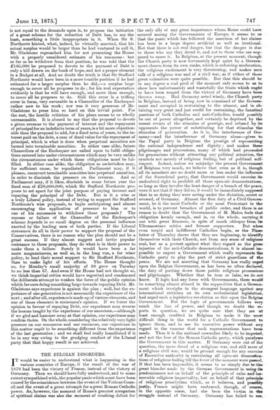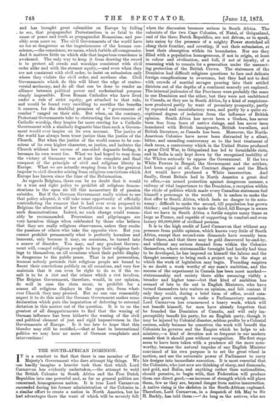THE BELGIAN DISORDERS.
IT would be easier to understand what is happening in the various countries of Europe, if the result of the war of 1870 had been the victory of France, instead of the victory of Germany. Then we should have fully understood, and to some extent sympathised with, the popular panic which must have been caused by the coincidence between the event of the Vatican Coun- cil and the event of a great triumph for a great Roman Catholic power. As, however, the moment of Rome's greatest arrogation of spiritual claims was also the moment of crushing defeat for the only ally of any great importance whom Rome could have secured among the Governments of Europe, it seems to us that the panic which has followed the assertion of her claims has been in a large degree artificial as well as irrational. Not that there is not real danger, but that the danger is due to those who say they dread it, and not to those who are sup- posed to cause it. In Belgium, at the present moment, though the Church party is now fortunately kept quiet by a Govern- ment chosen from its own ranks, which is enforcing moderation, the religious excitement is very threatening, and makes men talk of a religious war and of a civil war, as if either of these great calamities were quite possible. But that this should be in any degree a real peril of the moment only seems to us to show how unfortunately and wastefully the fruits which ought to have been reaped from the victory of Germany have been thrown away. Had Germany acted wisely, the Church party in Belgium, instead of being now in command of the Govern- ment and occupied in restraining to the utmost, and in ob- taining very great and just credit for restraining, the fanatical passions of both Catholics and anti-Catholics, would possibly be out of power altogether, and certainly be deprived by the recent events of the stimulus of prestige, and refused by its opponents the power of substituting for that stimulus the stimulus of persecution. As it is, the interference of Ger- many—and the interference of Germany alone—gives to the Papal party in Belgium the prestige of representing the national independence and dignity ; and makes these pilgrimages and processions, many of which had proceeded for generations without attracting any political attention, the symbols not merely of religious feeling, but of political self- respect. Indeed, unless we misjudge the present Government of Belgium very much, we believe that even as it is, though all its members are no doubt more or less under the influence of the Sacerdotal party, that Government would exercise ite undoubted right to prohibit all these open-air demonstrations, so long as they involve the least danger of a breach of the peace, were it not that if they did so, it would be immediately supposed that in so doing they were acting under the dictation, secret or avowed, of Germany. Almost the first duty of a Civil Govern- ment, be it the most Catholic or the most Protestant in the world, is to prevent breaches of public order, and there is -no reason to doubt that the Government of M. Malou feels that obligation keenly enough, and is, on the whole, carrying* out with great firmness, in spite of much obloquy from Its Ultramontane critics and former supporters. But when even torpid and indifferent Catholics begin, as the Time letter of Thursday shows that they are beginning, to identify themselves with their Church, not from any sense of religions zeal, but as a protest against what they regard as the gross injustice of the anti-Catholic demonstrations, it is almost im- possible to expect a Government which really represents the Catholic party to play the part of strict guardians Of the peace. We are not asserting that Germany has really urged upon the Belgian Government, as has been so often declared, the duty of putting down these public religious proceesione and pilgrimages. Whether that be true or false, we do not know. If logic had any force with Governments, there would be something almost absurd in the supposition that a Govern- ment which inveighs in the strongest language against any international criticism on its own ecclesiastical legislation, had urged such a legislative revolution as this upon the Belgian Government. But the logic of governments follows very much the line of power, and though we doubt the re- ports in question, we are quite sure that they are -st least enough credited in Belgium to make it the 'meet difficult thing in the world for a Catholic Government to ignore them, and to use its executive power without any, regard to the rumour that such representations have been made. Thus it is the national cowardice likely to be imputed, and not the fear of the Roman Catholic party, which paralyses the Government in this matter. If Germany were out of the question, the mere dread of a religious war, and still more of a religious civil war, would be ground enough for any exercise of Executive authority in restraining all open-air demo/Nitra- tions of religious feeling till the fever of the moment were passed. If that has been impossible, it seems to us simply due to the great blunder made by the German Government in using-its predominance not on behalf of the principle of calm and inn. movable religious impartiality, but on behalf of that principle. of religious proselytism which, as it believes, and poseibly justly, France might have embraced, though, of move, in the opposite sense, had she been the victim in -the struggle instead of Germany. Germany has failed to .see. and has brought great calamities on Europe by failing . to see, that propagandist Protestantism is as fatal to the cause of peace and truth as propagandist Romanism, and pos-
sibly even more so. The civil Governments of the world have no foe so dangerous as the imperiousness of the human con- science,—the conscience, we mean, which forbids all compromise.
And it matters little on which side that imperious conscience is awakened. The only way to keep it from drawing the sword is to protect all creeds and worships consistent with civil order alike and with the sternest equity,—and even when they are not consistent with civil order, to insist on submission only where they violate the civil order, and nowhere else. Civil
Governments which do this will blunt the edge of contro- versial acrimony, and do all that can be done to render an alliance between political power and ecclesiastical purpose simply impossible. Even Roman Catholics who have lived under a rule of strict equity, get attached to that rule, and would be found very unwilling to sacrifice the benefits it ensures, for the doubtful promises of a "government of combat" ranged on their side. But when, on the contrary, Protestant Governments take to obstructing the free exercise of Catholic worship, they inspire far more craving for a Catholic Government with a similarly dogmatic bias than such a Govern- ment would ever inspire on its own account. The justice of the world has always been truer justice than the justice of the Church. But when the justice of the world ceases to be con- scious of its own higher character, as justice, and imitates the Church without her excuse of one-sided dogmatic feeling, it becomes its own worst foe. What we had hoped to reap from the victory of Germany was at least the complete and final conquest of the principle of civil and religious liberty in Europe. What we are actually reaping from it is the greatest impulse to civil disorder arising from religious convictions which Europe has known since the time of the Reformation.
As regards Belgium, there can be no doubt that it would be a wise and right policy to prohibit all religious demon- strations in the open air till this momentary fit of passion subsides. But if the German Government really wishes to see that policy adopted, it will take some opportunity of officially contradicting the rumour that it had ever even proposed to Belgium the alteration of her Constitution so as to prohibit such demonstrations. Indeed, no such change could reason- ably be recommended. Processions and pilgrimages are very harmless things when celebrated by those who believe that they are really religious observances, unless they excite the passions of others who take the opposite view. But you cannot prohibit permanently what is perfectly harmless and innocent, only because it may, on occasions, be turned into a source of disorder. You may, and any prudent Govern- ment will, compel religious people to keep their religious feel- ings to themselves, on all occasions where their public display is dangerous to the public peace. That is not persecution, because nobody pretends that religious people are bound to flaunt their convictions publicly on all occasions, and very few maintain that it can even be right to do so if the re- sult is to be a riot and the crimes which a riot involves. The Belgian Government, therefore, would, in our opinion, do well in case the riots recur, to prohibit for a season all religious displays in the open air, from what- ever Church they may proceed. But no one can reasonably expect it to do this until the German Government makes some declaration which puts the imputation of deferring to external dictation in this matter out of the question. It is to us the greatest of all disappointments to find that the waxing of German influence has been hitherto the waning of the civil and political element of just and rigid impassiveness in the Governments of Europe. Is it too late to hope that this blunder may still be rectified,—that at least in international politics we may hear no more of German complaints and interventions?



































 Previous page
Previous page